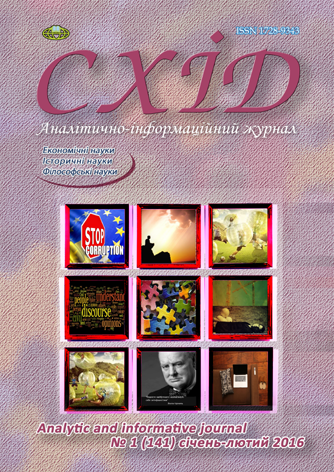Methodology of historical philosophical research within the context of current philosophical process
DOI:
https://doi.org/10.21847/1728-9343.2016.1(141).64821Keywords:
methodology, historiography, subject, reconstruction, hermeneuticsAbstract
In the domain of the Ukrainian history of philosophy one can clearly observe symptoms of eclecticism, contamination, and methodological ambiguity. Such situation is rooted in continuous insufficiency of the methodological framework of Ukrainian philosophy, split by competing ideological structures. Critical condition of humanitarian epistemology is aggravated by the urgent need to overtake foreign studies in the corresponding field, which constantly increase in number and evolve in character. The article aims at critical assessment of methodological approaches to historical philosophical analysis within the light of current philosophical studies. Analysis of the relevant literature on the problem of how to identify the character of interference between the target philosophical discourse and the discourse of the historical reconstruction allowed revealing the critical lines of relativist archeology and traditional historiography. Relativist approach is averted from the dimension of concrete texts to logical anachronistic speculations over seemingly evident contextual links. Such strategy is legitimate to sustain logical descriptions of the categories exempted from the certain paradigm but it is useless to reveal factual genealogical links between the discourses of the two philosophers. Descriptive studies seem to fall prey to hermeneutic ambiguity in referring to a set of ideas forming the canon of perennial philosophy. It is proved that historiographical approach enables to objectively examine genetic relations between various corpora of philosophical texts.
Nowadays the Ukrainian historico-philosophical science is going through a harsh crisis of methodology, caused by distortion of universal coordinates of scientific thinking allegedly providing the condition of the so-called methodological pluralism. Numerous discussions focus on the question about the very scientific nature of history of philosophy as a branch of knowledge. The tendency which appears to prevail in such disputes defines history of philosophy as philosophy in contrast to the opinion that history of philosophy should be rather seen as approximate to social history.Downloads
References
Gorsky V. S. (1981), Historical-philosophical interpretation of text, Naukova Dumka, Kyiv, 206 p. (rus).
Yemelianov B. V. (2003), Theory and methodology of the history of philosophy (review of Z. A. Kamensky’s works), In: History of Philosophy Yearbook‘2001, Nauka, Moscow, pp. 121-134 (rus).
Kamensky Z. A. (2003), On concepts “method of investigation in history of philosophy” and “rational reonstruction of historico-philosophical process”, In: History of Philosophy Yearbook‘2001, Nauka, Moscow, pp. 135-143 (rus).
Karpenko A. (2013), Methodological collisions of Heidegger studies: biographical transcription in the reflex of ideological historiography, Skhid, № 6(126), pp. 269-273 (ukr).
Rudenko S. V. (2012). Rational reconstruction of history of Ukrainian philosophy in context of basic principles of methodological falsificationism and historicism, The Herald of Taras Shevchenko national university of Kyiv (Philosophy. Political science), Vol. 106, pp. 36-39 (ukr).
Skyrtach V. (2014), Conceptualization of a mentally ill person subject in anti-psychiatry, Skhid, № 6(132), pp. 121-125 (ukr).
Bardon A. (2013), A brief history of philosophy of time, Oxford University Press, New York, 198 p. (eng).
Iggers G. (2008), A global history of modern historiography, Routledge, New York, 449 p. (eng).
McCumber J. (2011), Time and philosophy: a history of continental thought, Acumen, Durham, 425 p. (eng).
Tucker A. (2004), Our knowledge of the past: a philosophy of historiography, Cambridge University Press, New York, 304 p. (eng).
Tucker A. (2009), A companion t othe philosophy of history and historiography, Wiley-Blackwell, Chichester, 572 p. (eng).
Watson P. (2000), The modern mind: an intellectual history of the twentieth century, Perrenial, New York, 861 p. (eng).
Zweerde E. (1997), Soviet historiography of philosophy: Istorico-filosofskaja nauka, Springer, Dorderecht, 305 p. (eng).
Downloads
Published
How to Cite
Issue
Section
License
Copyright (c) 2016 Viacheslav Stepanov, Maria Chebotnikova

This work is licensed under a Creative Commons Attribution-NonCommercial-NoDerivatives 4.0 International License.
1. Authors bear responsibility for the accuracy of facts, quotations, numbers and names used.
2. Manuscripts are not sent back.
3. The publisher does not always agree with the authors' opinion.
4. The authors reserve the right to authorship of the work and pass the first publication right of this work to the journal under the terms of a Creative Commons Attribution-NonCommercial-NoDerivatives 4.0 International License. This license allows others to distribute (copy) the published work for non-commercial purposes, provided there is mandatory attribution to its authors and a link to the first publication in our journal.
5. The authors have the right to conclude separate supplement agreements that relate to non-exclusive work distribution in the form in which it has been published by the journal (for example, to upload the work to the online storage of the journal or publish it as part of a monograph), provided that the reference to the first publication of the work in this journal is included.

